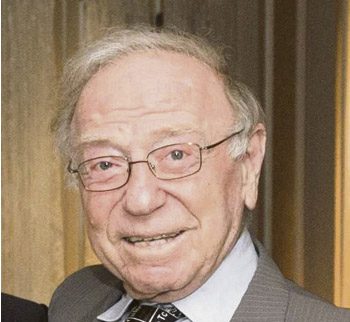OTTAWA — Prof. Daniel Hillel, the 2012 recipient of the World Food Prize, has advised and helped several of Israel’s hostile neighbours.
Hillel is optimistic that co-operation in areas such as water, agriculture and food delivery will break down barriers and build bridges between Israel and other Mideast countries.
“I have a vision of peace that may not seem practical, but to me it seems real. Ultimately, it will prevail,” he said, at the International Development Research Centre (IDRC).
He was speaking on the topic “The Threatening Global Environmental Crisis: Can We Predict It and Respond Effectively?” His April 17 lecture was also webcast live.
Hillel’s work on micro-irrigation, the steady trickle of finely calibrated amounts of water onto crops, has radically changed agriculture around the world, enabling people in areas previously impossible to cultivate to grow crops and feed their populations.
An Israeli, Hillel has travelled around the world, sharing his research and discoveries with such countries as Jordan, Egypt, Sudan, Pakistan and Turkey.
In an interview with The CJN before his lecture, Hillel described his early years as a pioneer – both as a scientist and as a founding member of Kibbutz Sde Boker in Israel’s Negev Desert.
After graduating from Rutgers University with both bachelor and master’s degrees in soil science, he returned to Israel where he had grown up – Hillel was born in the United States – and was given the task of mapping and classifying the soil of the country, from north to south.
Along with a group of 11 other men, Hillel decided to remain in the Negev and found Kibbutz Sde Boker. The early years were extremely difficult, Hillel recalled. Several of the men were killed by marauding Bedouin. Growing anything there was impossible due to lack of rainfall. But by y building terraces and catching water, an irrigation system was put in place to water crops and the settlement succeeded.
One day in 1953, a jeep arrived at Sde Boker and prime minister David Ben-Gurion emerged. “He stood transfixed,” said Hillel, in awe of what was being done in such a barren spot in the desert.
“Ben-Gurion asked if we needed any help – and if there were any age restrictions,” said Hillel. When Ben-Gurion decided to join them, “the country – the world – was flabbergasted. He left the government and joined Sde Boker.”
Ben-Gurion dispatched Hillel to various locations, beginning with Myanmar –then known as Burma – to assist with agricultural challenges, and so began Hillel’s international career as an agricultural adviser.
“I have worked in some 30 countries around the world as an agricultural adviser. In the process, I have taught many students in various universities around the world and have been involved in co-operative research,” Hillel said.
Hillel is currently a senior research scientist at the Center for Climate Systems Research, part of Columbia University’s Earth Institute. In association with the NASA Goddard Institute for Space Studies, he has recently worked on the adaptation of agriculture to climate change.
